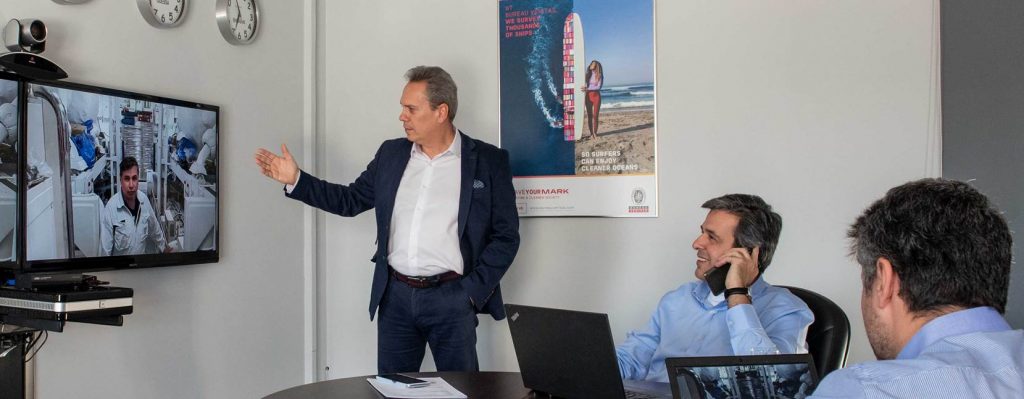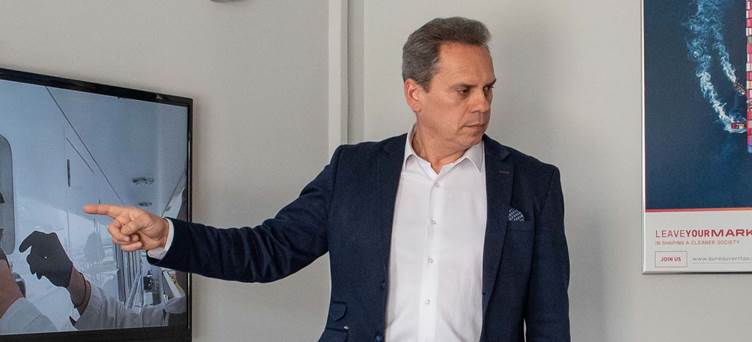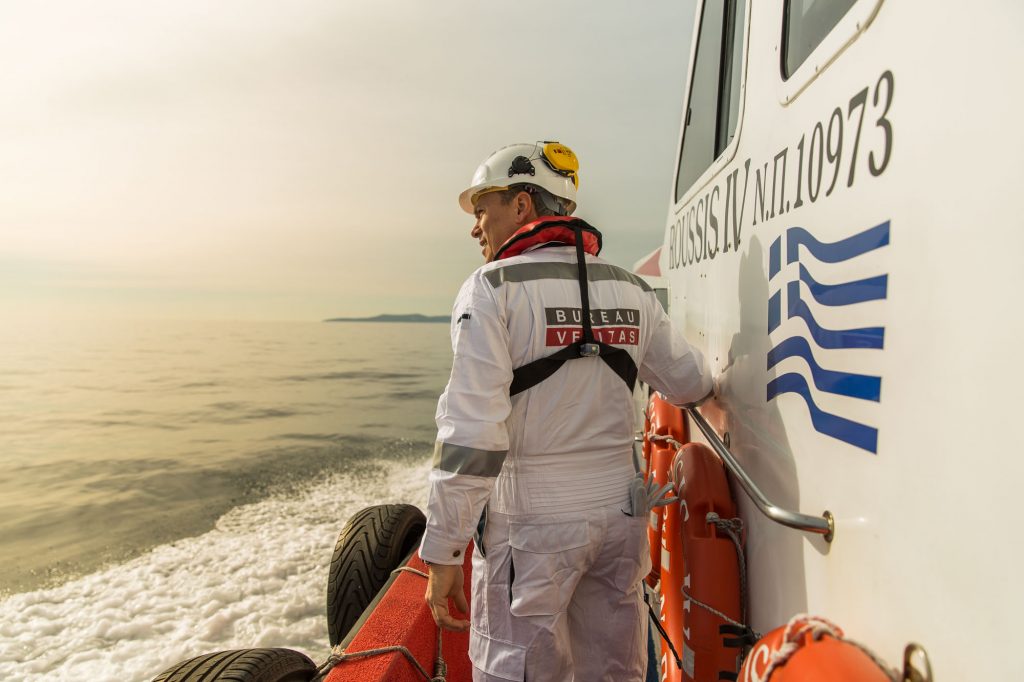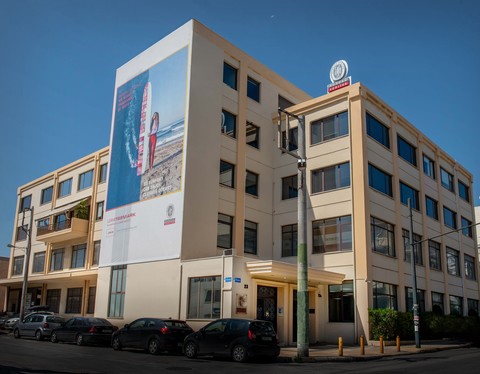Mike KASMAS (Bureau Veritas Piraeus NS Operational Manager Piraeus & SSQM for Greece, Cyprus & Malta) has given an interview to Anny J. Zade (www.allaboutshipping.co.uk) on Class issues.
We continue our interviews with prominent members of our Shipping world and this time we have the third in the series on Class Societies with Mike Kasmas from Bureau Veritas Piraeus, a society approaching its bicentennial. Mr Kasmas is the NS Operational Manager in Piraeus and Israel as well as the NS Quality Manager for Greece, Malta, Cyprus and Israel, Principal surveyor and CAP Project Manager. He was recently elected at the BoD of the Chios Marine Club were he holds the position of vice president.
Class Societies are the guardians helping maintain standards for total ship safety, protection of seafarers as well as the environment and improving life ashore.
Anny Zade from allaboutshipping asked him some critical questions given the uncertainties and restrictions faced by the industry amid the Coronavirus pandemic, and the challenges of this technological turning point:
How has BV managed to maintain services to clients in your region, given the restrictions resulting from Covid-19 on travel, personnel attending their offices, and port operations?
COVID 19 pandemic has a negative impact to all BV operations in the shipping sector. Our H.O has establish the BV M & O measures against pandemic , emergency response plans, as well as business continuity plans for all B.V personnel worldwide. All our employees should follow the Group M & O HSSE procedures and instructions based on latest BV M&O safety and health alerts taking into account the global and national Authorities legislation.
All request for surveys at yard, or surveyors participation in the ports and/or during sea trials, in service or offshore floating installation are treated properly, taking into account all precautions by performing a risk evaluation study prior any intervention.
Attendances within our territory is mainly performed subject to evaluation of all mentioned above safety risks.
Travelling abroad is presently suspended as stated in our global health and safety M & O policy on very exceptional cases a special authorization may be granted by evaluating risk by our H.O HSSE Compliance Director.
For personnel visiting our office if considered necessary, a local procedure has been set, and a proper visitor’s form is requested to be completed as set out and implemented by our local B.V office HSSE policy.
Shipping companies and their involvement on their fleets operations at ports, should follow advices provided by United Nations agencies including the World Health Organization (WHO), the International Maritime Organization (IMO) and the International Labor Organization (ILO), as well as the European Centre for Disease Prevention and Control (ECDC).

Can remote survey methods ever equal the traditional personal inspection of vessels and maritime installations?
Remote surveys are recently developed by Classification societies and mainly established as alternative method of performing surveys due to limitation on physical vessel’s inspections (COVID issues)by classification societies surveyors. Remotely located surveyors in Greece and world-wide, using imagery and real time video, are able to connect with ships, shipyards and with dispersed stakeholders and experts – in total confidence. In addition, remote surveys offering Significant benefits to clients include speed of response and no travel or waiting time; optimization in the decision making process thanks to livestreaming solutions; continuous improvement in the quality of service; and cost control through overall reductions in travel time and arrangements. At a vital time for shipping, the global economy and society, BV’s remote, connected and digital services are providing an essential business resilience role for ship owners and operators, ensuring that they can continue to operate in a safe and compliant manner. Services like remote survey are the product of years of research, development and pilot projects. Remote surveys are developed to confirm and/or witness vessel’s conditions close to the traditional inspections gained by physical attendances. However, by performing remote surveys, limitations on the scope of surveys have been set. In addition flag administration consent is granted where found necessary.
How efficiently in the current situation are you able to get samples to labs for testing?
Bureau Veritas VeriFuel have developed a controlled samples transportation network that expedites shipping with proactive pick up.
As such, during the COVID19 pandemic period despite some inevitable delays, our transportation network has been resilient enough to deliver all samples to our labs for testing.
In case of urgency, it is always possible to do the needed fuel analysis locally, in one of our 100 BV-owned laboratories around the world at a surcharge.
Note that we are also in the process to activate another lab in Shanghai due to the increasingly local logistics challenges.

The International Association of Classification Societies says that cyber security systems have become as integral a framework for a ship’s safety as structure and machinery. How can the shipping industry make their fleets more resilient against cyber attack, and is it acting swiftly enough?
The shipping industry is just starting to move slowly on this aspect, mainly due to the new IMO requirements for inclusion of the cyber security threats and related procedures in the company’s SMS. Vetting organizations such as OCIMF and Rightship also push for such procedures to be developed. Insurers also start to offer coverage schemes for cyber attacks, at the same time looking for companies to apply specific measures as a prerequisite for offering their products.
Bureau Veritas was very early to realize the threat of cyber attacks on ship’s IT and operational systems, considering the increase in digitalization of these systems on board. As early as 2016, BV introduced the SYS-COM notation, focusing on operational systems connected and monitored or even controlled from shore. In 2018 BV introduced an all encompassing rule note, introducing the CYBER MANAGED and CYBER SECURE notations. It was the result of a series of workshops with industry players and has been accepted by the industry as a practical “how to” guide on addressing all cyber threats. It considers all existing frameworks (ISO, NIST, BIMCO) but applies them in practical and pragmatic manner, considering the specifics of the marine industry. More and more vessels apply the notation requirements, and follow the guidelines for performing meaningful risk assessment and providing practical instructions to crews on board and to personnel ashore.
BV is currently leading the IACS Cyber panel and is promoting the move to adopt an integral framework to protect vessels and their crews from the effects of malicious cyber attacks. In addition to procedures and instructions, shipyards and system designers should concentrate efforts to produce equipment and vessels that include cyber security features by design. BV is promoting this via reviewing equipment and providing Type Approval Certificates in accordance with the CYBER SECURE notation.
What role is BV playing in helping to decarbonise shipping?

Bureau Veritas is taking the practical route on decarbonization to be able to assist our clients in this path. This means that we are investigating all possible future fuels and their effects on vessel safety and performance. We achieve this by taking part in JDPs for development of the technologies that involve shipyards, engine/equipment makers and owners. One recent example is the safety workshop for ammonia as fuel with MAN, Shell, SHI and several owners, designers and equipment makers. All fuels are examined in practice and experience is gained that is passed to our clients. At the same time, BV examines the short term IMO measures and informs our client on how their fleets will be affected and what could be the best course of action for compliance.
BV plays the role of an educator and disseminator of knowledge to the society. IMO sets the targets and BV along with the other IACS societies define the potential pathways to be followed for the targets to be achieved. BV like other IACS Class societies actively demonstrates its ongoing commitment to supporting the work of IMO on decarbonization by also being its principal technical advisor. BV acts as a recognized organization in the verification of the IMO Data Collection System, DCS as well as in the regional MRV European regulation. It is an axiom that you cannot reduce what you cannot measure. It is thus evident the important contribution of BV in the reduction of carbon dioxide emissions and GHG in general, through its vital contribution in establishment of the quantities emitted. BV also provides valuable assessment of various implementation elements of the decarbonization process on the proposed short, medium and long term measures aiming to reduce the carbon intensity of international shipping, with a view to assisting in their global and consistent implementation. BV undertakes extensive work in verifying compliance of the IMO-mandated requirements on behalf of IMO Member States in its capacity as Recognized Organization, and to provide greater clarity for all industry stakeholders. Further, BV has the view that IMO is the appropriate and technically competent body to address GHG reduction measures globally. BV will use its accumulated knowledge and expertise to strive for a practical implementation of any proposed measures in order to support that all new regulations are technically feasible and capable of being applied. BV also ensures that all proposed measures satisfy IMO requirements regarding safety like for example the minimum propulsion power requirement. BV is not engaged in the political or commercial aspects of the decarbonization process. It ensures though that any measures developed, agreed and implemented are based on scientific and transparent evidence.
…and finally,
What services and advice are you offering shipowners over the tough questions about fuel choices and whether to adopt the ‘scrubber’ route to curbing emissions?

The IMO Sulphur Cap regulation in effect from January 1st 2020 is now well implemented and choices to comply by scrubber or by use of VLSFO have been taken by owners. The choice is still there for new construction vessels but is mainly mandated by chartering requirements. BV’s role in this process was not to support one or the other choice but to be on the owner’s side and assist in the safe and practical application of their choice. BV Piraeus formed a special “Task Force” to be able to successfully manage and complete safely hundreds of scrubber retrofits that took place within 2019 and 2020. BV VeriFUEL experts assisted our clients with the challenges of adopting and using the new Very Low Sulfur Fuel Oils. Bureau Veritas Solutions, the BV consulting branch performed the engineering studies for several retrofits.
The shipping industry contributes 2-3% of global man-made greenhouse gas (GHG) emissions, and is expected to act upon the Paris Agreement to reduce these GHG emissions. In April 2018, the IMO adopted the initial GHG reduction strategy with a vision to decarbonize shipping as soon as possible within this century and reduce total GHG emissions from international shipping at least by 50% in 2050 as compared to 2008 levels. The 50% emission reduction will likely call for widespread uptake of zero-carbon fuels, in addition to other energy efficiency measures, including improvement of the existing energy efficiency framework. For future fuels related to decarbonization, in addition to the JDPs mentioned above, BV and BVS are performing tailor made feasibility studies for application of new fuels and new technologies on board specific vessel types. In this way ship owners can examine the techno-economic aspects of a technology choice and make well educated strategic decisions about the future of their fleets. It is important to choose the right fuel for a fleet among the variety of choices. The future society will be multifuel. Wrong choice will be detrimental and it may result to the so called “stranded assets”. The burden of choice lies with the management and decision makers of the shipping companies. BV on the other hand provides all the necessary technical characteristics of the new fuels, makes techno-economical comparisons between the new and the conventional fuels and assists in the development of codes to ensure safe implementation like for example the IGF code, where the contribution of BV on its development was significant. For the different alternative fuels that include biodiesel, biogas, Fischer-Tropsch diesel, alcohols, natural gas, ammonia and hydrogen, BV studies their sustainability, availability, green production with renewable energy sources, adaptability to existing engines, safety, cost, performance, economy and last but not least their environmental impact in terms of emissions.
Due to the significant difference in properties, characteristics and behavior between alternative and conventional marine fuels, many safety, technical, operational and training aspects should be considered and due attention should be paid in order to ensure safe storage, transport, bunkering and use of the alternative fuel as ship-fuel. BV is a major contributor in leakage prevention and a controller of all sources of ignition. All these aspects are covered by international and national regulatory frameworks. BV along with the other IACS members has developed guidelines for the use of alternative fuels as ship fuels within class rules. BV has been involved in many national and international projects investigating different aspects of using alternative, carbon reducing fuels, so that BV can be considered as pioneer in this active area of research.